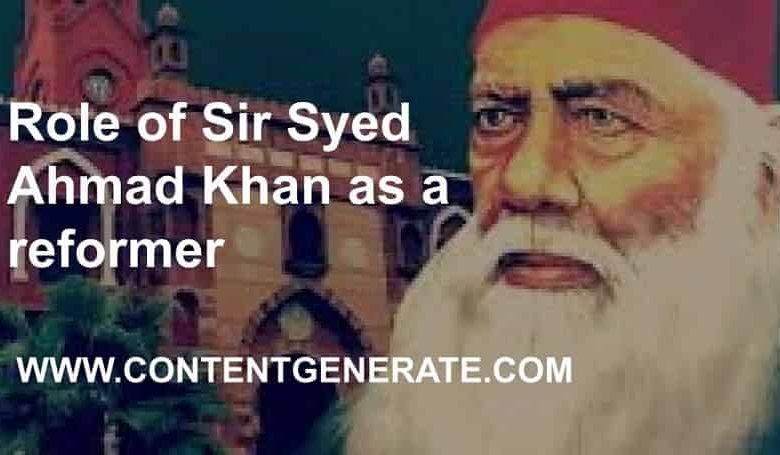Role of Sir Syed Ahmad Khan As A Reformer

This entry discusses the educational, social, and political role of Sir Syed Ahmad Khan as a reformer in the development of Muslims during the British raj.
Contents
Background
After the 1857 war of Independence, the British held Muslims responsible for the revolt against the British. With that, the British Indian government carried out a vicious wave of revenge against the Muslims characterized by brutal persecution, torture, humiliation. As a result, the hatred towards the British further increased that in turn led to a systematic marginalization of Muslims in all fields of life.
Role of Sir Syed Ahmad Khan soon after the 1857 Revolt
As the British considered the Muslims responsible for the 1857 revolt and carried out a vicious wave of revenge against them. Sir Syed Ahmad Khan, who had saved many lives of the British during the revolt stepped up to challenge the British rhetoric they adopted as to who was responsible for the revolt and who was not?
Sir Syed wrote an essay “the Causes of the Revolt” in which he blamed British policies against locals for the rebellion. He pointed out that the revolt was a joint action of both Hindus and Muslims. Moreover, he referred to the services the Muslims rendered in saving the lives of the British during the rebellion.
Sir Syed Ahamd Khan sent copies of this essay to members of the British parliament. The British parliament took it as an important revelation and analysis with exception of a few who instead asked to initiate a seditious case against Sir Syed for writing this article. This essay acted as guidance in revisiting their anti-Muslim policies in India and helped decrease brutal treatment with the passage of time.
Role of Sir Syed Ahmad Khan in the promotion of modern education
After the revolt, Muslim schools closed in the wake of the stoppage of funds from the Government. Muslims did not send their children to get an English education as they considered it anti-Islam. Consequently, a whole generation grew illiterate and uneducated. In contrast, Hindus having received modern education dominated social, economic, and political life under British rule.
Sir Syed could not see this miserable educational backwardness of Indian Muslims. He felt only receiving modern education could improve the conditions of Muslims. On the contrary, the lagging behind in education would leave them behind in every field of life vis a vis other communities.
Forecasting the future, Sir Syed established a school in Ghaziabad in 1859 and in 1863. He set up a Scientific Society which translated research and scholarly articles from English into Urdu for a wider Muslim audience. From these translation works the Muslims enlightened themselves about development in science and society.
Sir Syed established Muhammadan Anglo-Oriental School in 1875 in Aligarh in Utarparadesh in India. The government upgraded to college in 1877 which subsequently acted as the center of learning for Muslims all over India.
Role in the political life of Indian Muslims
Advice to keep aloof from politics of agitation
As a result of the anti-Muslim policies of the British, the Muslims faced political isolation and marginalization. They were not given representation in councils. Muslims thought government decisions and steps in the name of development etc did not represent the needs and aspirations of Muslims comparatively. Consequently, Muslims always remained apathetic towards the British and seemed to be in a mood to confront them any time.
Sir Syed Ahamd Khan came forward to guide Muslims to come out of this important historical phase. He advised Muslims to unconditionally cooperate with the British and show loyalty to the government. It would earn them create a sense of goodwill and trust of the British in Muslims.
British were to remain in India and were much powerful with Hindu support than before. Any confrontation or hostile approach would cause more damage to Muslims than what it had caused during and after the 1857 revolt. Therefore, Sir Syed advised Muslims to keep aloof from politics until relations have got better between Muslims and Hindus.
Criticism of the Congress
Sir Syed Ahmad Khan criticized the creation of the Indian National Congress. In his view, India was a subcontinent in which people of different communities, cultures, religions live.
For him, the western concept of democracy would make the congress a Hindu-dominated political party that would divide Indians into communal lines in the future with far-reaching repercussions. Therefore, he advised Muslims of the Indian subcontinent to avoid Indian National Congress.
Role in the establishment of All India Muslim League
Sir Syed Ahamd Khan founded the Muhammadan Educational Conference in 1886 as part of the Aligarh Movement. It was in the annual session of the Muhammadan Educational Conference that the establishment of the Muslim League took place. On the following day of the session on 31st December 1906, the participants formally founded the All India Muslim League with Sir Aga Khan III as its first president.
Thus Sir Syed and Aligarh Movement have a direct role in the formation of the All India Muslim League in 1906. It was the league that played the central role in the protection of Muslim rights and the interest before 1940. After 1940, the league under the leadership of Muhammad Ali Jinnah achieved a separate Muslim state in India.
Role in the improvement of the social and economic status of Muslims
Literature supporting the Two-Nation Theory suggests that Muslims were looked at with disdain and disrespect. They were treated as if they were inferior to others during the British Raj. Sir Syed’s educational efforts produced men of high stature among Muslims in education, poetry, politics, economic, etc.
The graduates of Aligarh College played important role in the overall improvement of the image of Indian Muslims. Additionally, they played an important role in the overall development of society. Now, nobody discouraged them from undertaking trade and commerce activities to improve their economic conditions.
Conclusion
The above discussion thus helps conclude that Sir Syed Ahmad Khan was a great Muslim scholar of his time. He rescued Muslims at a time when they had fallen into an abyss of socio-economic and political degradation. He guided Muslims out of this difficult phase of their life towards a new start.


